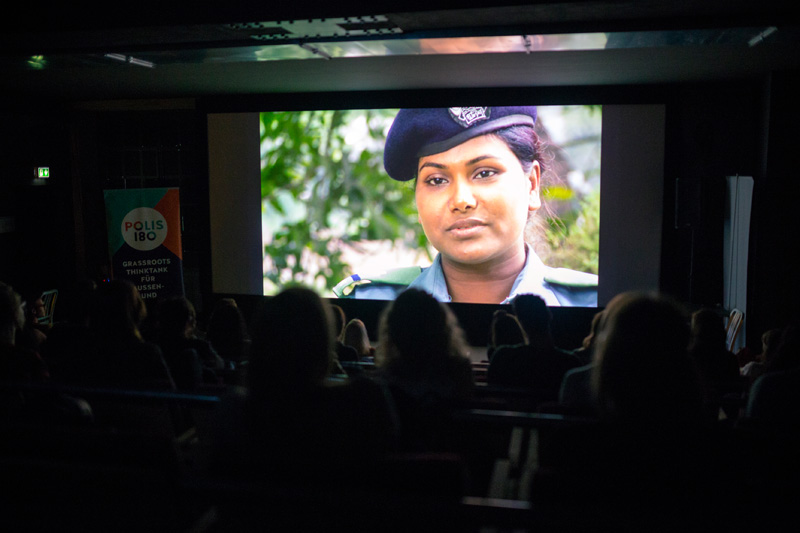RE-THINKING SECURITY: On the Role(s) and Perspectives of Women in UN Peacekeeping Missions
Photographer: Frieder Unselt
On the 8th of June, Polis180 together with the United Nations Association of Germany (DGVN) hosted a film screening with a subsequent discussion on the chances, challenges and perspectives of women’s involvement in peacekeeping and security issues at large. Taking place at Eiszeit Kino in Berlin-Kreuzberg, the event offered a unique opportunity to get a close-up view of how peacekeeping is practiced and which roles women (can) play in it.
A review by Britta Garde and Cora Berner
The screening of “A Journey of a Thousand Miles – Peacekeepers” served as foundation for the subsequent discussion. The documentary, directed by Academy Award winners Sharmeen Obaid Chinoy and Geeta Gandbhir, follows three women from Bangladesh who join the United Nations Stabilization Mission in Haiti (MINUSTAH) as part of an all-female, predominantly Muslim peacekeeping unit. It thereby allows valuable insights into the work of peacekeeping missions and the challenges that women working in the security sector are confronted with – both on a professional and on a private level.
In the subsequent discussion, valuable insights were shared by Annika Hansen from the Center for International Peace Operations (ZIF), Nicole Birtsch, Research Associate at the German Institute for International and Security Affairs (SWP), and Christoph Lüttmann from the Berlin Center for Integrative Mediation (CSSP). The debate focused on the roles women play in peacekeeping nowadays, current efforts and obstacles to implement UN Security Council Resolution 1325 on Women, Peace and Security and possible ways to put a more inclusive peacekeeping approach into practice. The discussion was moderated by Sonja Schiffers from Polis180.
One important point frequently raised was that women already play a very important role at the lower levels – in municipalities or civil society organizations. However, at the higher level decision makers are still predominantly male. Christoph Lüttmann underlined that the difference that an involvement of women in deterring violence, building trust and stabilizing societies makes is immense, because – depending on the cultural and societal dynamics of a specific conflict – they might be perceived in a different way than men and thereby have access to otherwise closed parts of the society.
Drawing from her experience at the Afghan High Peace Council, Nicole Birtsch emphasized that women’s participation and involvement in peacekeeping often plays a secondary role in high-level peace negotiations. While decision-makers formally commit to Agenda 1325, when it comes to the actual implementation their determination remains low. Even if women are represented in negotiations they tend to lack the support that could make their voices count. Even within societies themselves, women are often taught not to believe that they are able to change something and that they actually can contribute to peace.
Drawing from her experience at the Police Division of the United Nations Department of Peacekeeping Operations, Annika Hansen spoke about the difficulties of achieving a gender balance in peacekeeping missions. One obstacle she highlighted relates to the willingness and capacity of UN member states to implement UNSCR 1325 domestically. In fact, this is critical since the implementation of the agenda in UN peacekeeping missions largely depends on how member states recruit and train the personnel they deploy. Thus, different levels of training become evident, for instance when it comes to weapons training – one of the issues also emphasized in the documentary. Interestingly, while 41 % of National Action Plans on UNSCR 1325 are implemented in EU member states, Annika Hansen noted that most women deployed in UN peacekeeping missions come from African countries, India and Bangladesh. By contrast, female staff from EU member states only make up a small percentage of UN peacekeeping missions.
All in all, the film screening and discussion complemented each other in providing valuable insights into the chances, challenges and perspectives of women’s involvement in peacekeeping and security issues. The experts emphasized how the participation of women can influence the outcome of various conflicts but also highlighted the numerous obstacles women still face in the security realm, be it in peacekeeping missions, at the negotiation table or in post-conflict contexts. Despite these challenges however, all three experts pointed to the progress they have experienced in their daily work and the importance of putting a more inclusive peacekeeping approach into practice.
We’d like to thank all participants as well as the DGVN for taking part in our event and sharing with us their valuable insights into the role(s) and perspectives of women in UN Peacekeeping Missions.
